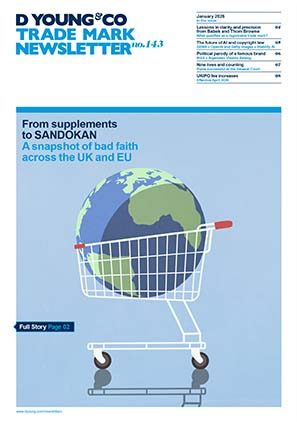WATER FRSH and CDY MLN – can ‘disemvoweling’ help to overcome descriptiveness or non-distinctiveness objections?
A recent German Federal Patent Court decision concerning the word marks WATER FRSH and CDY MLN has considered the new trend of ‘disemvoweling’ – whereby brand owners omit vowels from registered words – and whether this can help to overcome objections of descriptiveness or non-distinctiveness.
In short, the answer is no. The court confirmed that where the relevant public can recognise that a word was created through the removal of vowels, in particular in industries where this is common practice, it would be prone to make the word into a sensible German or English term that can be articulated. As such, the court must assess whether the whole word (ie, with vowels) is descriptive or non-distinctive for the goods and services in question.
Facts
In December 2017 the applicant filed the German trademarks WATER FRSH and CDY MLN for a variety of goods in Classes 4 and 34 relating to water pipes and other smoking products, as well as retail services in Class 35 for tobacco and tobacco products.
The German Patent and Trademark Office (DPMA) refused the applications, holding that they lacked distinctive character and that these terms should be kept free. The DPMA argued that omitting vowels is a popular play on words and not only a feature of text message language, but also a popular abbreviation trend in marketing. Therefore, the relevant public would be trained in reading words without vowels and equate WATER FRSH with ‘water fresh’ and CDY MLN with ‘candy melon’. These terms would then be understood to describe the flavour of the tobacco or smoking goods.
On appeal to the Federal Patent Court, the applicant argued that the terms would not necessarily be recognised as ‘water fresh’ and ‘candy melon’, but could be read as ‘water frisch’ or ‘water frosch’, or ‘cindy milano’ or ‘candy milano’. Following a court notice stating that the marks would not be registrable for most of the goods and services, the applications were eventually limited to Class 4 goods only – namely, charcoal for water pipes. The court then had to consider whether the marks were registrable for the remaining goods.
Decision
The German Federal Patent Court granted the appeal and held that WATER FRSH and CDY MLN were registrable for the remaining Class 4 goods. However, this had little to do with the meaning of the words and all to do with their meaning not being descriptive for the remaining goods.
The court held that while the terms ‘frsh’, ‘cdy’ and ‘mln’ could not be found in a dictionary, it would be obvious that these terms were created by leaving out vowels. The court then went on to say that tests have shown that the human brain does not necessarily need vowels to understand a text. For example, Semitic languages such as Arabic and Hebrew do not have vowels.
Further, tobacco companies often remove vowels from product names because, as of 2016, they are no longer allowed to indicate the flavourful or aromatic properties of their products.
As the trend of omitting vowels was already established at the time of filing the marks, the relevant public would read them as ‘water fresh’ and ‘candy melon’ in an effort to make the words into sensible German or English terms that can be articulated.
However, the court concluded that the flavour would not be a commercially relevant characteristic of charcoal. In fact, it opined that charcoal for water pipes would be expected to be odourless. As a result, the marks were not considered to be descriptive or non-distinctive.
This article was first published on World Trademark Review on 10 June 2021: www.worldtrademarkreview.com.

